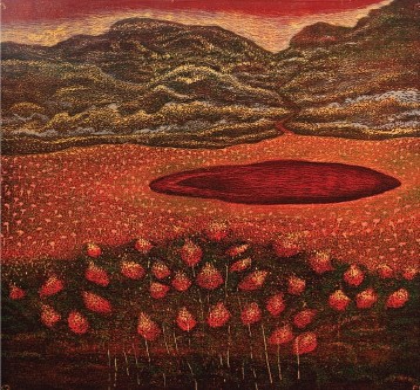
Note 48
Out of Print 48 features nine stories that deal variously with bodily afflictions – sensitive livers, gangrene – death, environmental destruction, displacement and the emptiness of relationships without love. Characters are left dead, wounded, bereft, saddened, resigned, or in some cases, looking forward.
The tragedy of Salma Siddiqui’s ‘Mangalsutra’, first published in 1976, is that the issues it raises, of religious identity, fear and patriarchy seem contemporary and relevant today. Translated by Out of Print author, Meenakshi Jauhari, it is set in a mortuary, where two men, influenced or, one might say, controlled by the oppressions imposed on them by family and community, each abandon the corpse of a young woman, a daughter, a lover. Told, in most part, in the voice of the dead woman, the narrative highlights the pain that each character must feel.
One day, Dina enters the lives of a family in New Jersey, invited by the protagonist into their dreary family flat and loveless marriage. Very soon, it is evident that not just her and her son, but her husband too, is enamoured of Dina. Has she dreamed up that Dina’s laughter dies down in the neighbouring bedroom, and that she hears ‘the door being pulled shut and locked’ when she naps with her son one afternoon. With this view through an uncompromising lens on a relationship lacking in love, and on the complexities of seduction, we examine what it takes to feel the draw of liberation in Prashila Naik’s ‘She Reminds Me of Sunshine’.
Avishek Parui’s ‘Lottery Ticket’ feeds into the hope, despair and desperation felt by Batuk Batyal. Derided by family and colleagues, he lives as someone who knows and accepts his position in the world. His one concession to the possibility of escaping his fate – the secret indulgence of buying lottery tickets. Until one day … he has a flight of fancy…. Will it release him? Or will the memory of possibility sustain him in his lonely life?
Arjun Rajendran’s ‘The Martyr’ is about two roommates, the narrator and as she says, ‘Vidya, who came with me from Guntur to Springfield’. When Vidya gets killed in a senseless shootout in which both characters are caught, we don’t know whether it was chance, or whether one moved to protect the other. This leaves the narrator, who is dealing with the trauma, in a quandary, especially given that their relationship bore the strange closeness yet distance of two people, without much in common, thrust together into the same living space.
In ‘Dr Pancrácio’s Liver‘, an amusing tale by Jose da Silva Coelho, the reader meets Dr Pancrácio – a doctor whose tempestuous liver renders him unable to carry out medical procedures to completion. Funny, vivid, and satirical, Paul Melo e Castro’s translation from Portuguese draws the reader into the pithy observations about twentieth century Goa that characterise much of Silva’s literary scope. ‘Dr Pancrácio’s Liver’ offers honed social commentary in a robust character sketch that lingers in the mind.
‘Selfie’ by Mohammed Khadeer Babu, translated from Telugu by Dhurjati Venkata Subhashri, one of the author’s ‘Metro’ stories, dives straight through illness to marriage. The reader is party to the phone conversation between wife and husband through which we find out that a marriage of desire has transitioned, through the pressures of life, into a state of suspended engagement. How will the discovery of a potentially dangerous growth impact the relationship.
Bela Negi’s ‘Gangrene’ as the name suggests, is a detailed description of the disease settling into the protagonist, Umed Singh’s leg. Her descriptions of the grotesque are tempered by an awareness of the environment, and insightful observation of life in the Himalayan foothills. Negi’s writing forces the reader to reckon with the body, illness and the state of healthcare in the country in an ornate narrative that is a skillful bracing of the senses.
This formally inventive piece from Kiran Bhat is our second story this issue centred around ecological concerns. ‘A Normal Day, Matahau, Tonga’ is a collection of reflective and recondite entries on volcanoes stretching as far back as twenty thousand years. Stylistically prominent descriptions, and acute considerations on the environment characterise this fascinating piece of writing featured in Issue 48.
Padmapriya Muralidharan’s piercing story ‘The Last Day’ is an invitation into the world of Manoma, a fisherwoman living by the Coovam river. Framed in the shadow of a tsunami-fueled evacuation, ‘The Last Day’ shows us the resilience of this woman with affecting clarity. Touching on themes as socially relevant as body autonomy, and imminent ecological disaster, Muralidharan’s story around one woman offers a poignant window into the lives of women in India today.
The art on the cover of Out of Print 48 is by Soghra Khurasami.
